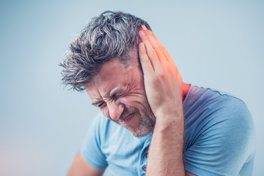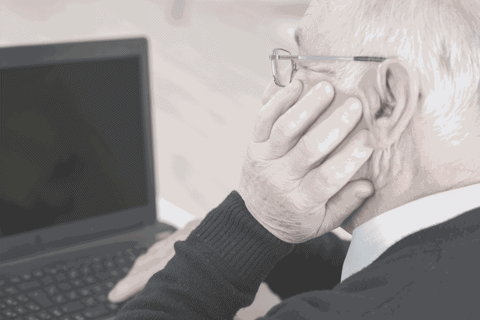
What to do if You’re Suffering From Work-Related Tinnitus
Static white noise. While some like to fall asleep to it, others find it incredibly grating - it’s this persistent, high-pitched sound that you want to stop, immediately.

Tinnitus is the sensation of hearing sounds such as buzzing, ringing, hissing, whistling or chirping in the ear, independent from any outside sounds. This can either be a continuous sound or intermittent, and it’s often worse when background noise is low.
Anyone who suffers from tinnitus may find they become more aware of the sounds when they’re alone, particularly at night when trying to sleep. Tinnitus can be caused by age-related hearing loss, work related hearing loss, diabetes or ear infections, as well as blockages in the ear. However, in most cases, it’s caused by exposure to excessively loud noise.
It’s known that people exposed to loud noise over long periods of time can experience both hearing loss and tinnitus which is consistent with damage to the inner ear. However, tinnitus can also be caused by a one-off traumatic acoustic event such as an explosion or from an unexpected and sudden noise, transmitted through a telephone or headset for example.



If you’ve been exposed to excessively loud noise at work and developed tinnitus as a result, you may be able to claim compensation on a No Win, No Fee basis.
For free legal advice get in touch with our Personal Injury Solicitors.
Medication can also cause tinnitus. Aspirin in large doses has long been recognised as being able to cause tinnitus. Quinine and some of the other anti-malarial drugs can occasionally cause damage to the ear when given in high or prolonged doses. However, taken in low doses to prevent malaria, this does not usually happen.
Specialised and powerful antibiotics that can be ototoxic – in other words they can damage the inner ear - can cause hearing loss and a small number of the affected people develop tinnitus as a consequence of this hearing loss. Antibiotics such as streptomycin and gentamicin fall within this group.
Unfortunately, there’s no cure or operation that can be given to cure tinnitus. Most people find that their tinnitus gets less noticeable over time, as the brain gradually learns to filter it out (this is known as 'habituation').
Cognitive behavioural therapy and sound therapy may also help an individual manage the condition, as well as the use of hearing aids, which can help by removing the strain from hearing and increase auditory input, making the individual less aware of their tinnitus. Counselling, however, is generally the key to successful treatment, combined with the aforementioned methods.
There are several industries in which workers are at a high risk of noise induced hearing loss and/or tinnitus, including:
A person can also suffer from occupational deafness/tinnitus just from working in a noisy factory or working environment. In order to make a successful personal injury claim for compensation, you need to show that your tinnitus is linked to an injury that you sustained at work.
Generally, this can be shown provided you can establish that you’ve been exposed to excessive noise at work without suitable personal protective equipment or experienced a one-off acoustic trauma, such as a very loud bang. If so, then your employer can be held liable for this. All employers in the UK have a legal duty of care to provide adequate protection for their employees, such as providing the correct PPE equipment to protect employees from excessive noises.
Legislation including the 1974 Health and Safety at Work Act, as well as The Noise at Work Regulations 1989, all guide employers in their duty of care to their employees. Specific legislation dealing with noise, tinnitus and hearing loss are now more recently detailed in the Control of Noise at Work Regulations 2005.
Essentially, the position at common law (pre-1990), post-1990 to 2005 and post-2005 are all slightly different with regards to the levels of noise that might trigger an employer’s liability for causing noise induced hearing loss and/or tinnitus. Generally pre-1990, exposure to at least 90 Db of noise over an 8-hour day needs to be established before an employer was required to provide hearing protection.
Post-1990, but pre-2005, then noise levels must be at least 85 Db over an 8-hour day before hearing protection should be provided with enforcement of hearing protection to noise levels over 90 Db. After 2005, lower levels of noise require the employer to take steps to protect an employee’s hearing. Exposure to noise levels of between 80 to 85 Db now require hearing protection to be provided and if noise levels exceed 85 Db in the workplace, hearing protection must be enforced.
A medical expert can conduct a pure tone Audiogram (hearing test) to identify any associated hearing loss. With respect to tinnitus, a questionnaire to evaluate the effects and the degree of distress suffered by an individual can be used.
Tinnitus is believed to accompany about 50% of noise induced hearing loss cases and it’s generally graded as being of slight severity, mild, moderate, severe and catastrophic. The severity generally depends upon the individual’s reaction to the tinnitus rather than any objective measurable characteristics. The pitch, its loudness and the degree to which the tinnitus might be marked by other sounds are all relevant.
If you’ve been affected by excessive noise, our Personal Injury Solicitors could help you. If you’re suffering the effects of damaged hearing, such as dizziness, motion sickness or disorientation, you should seek medical help in the first instance.
If you have ringing, whistling, hissing, buzzing, or humming in your ears, you may well have tinnitus. All forms of hearing damage from excessive exposure to high levels of noise can leave you feeling stressed, fatigued and irritable.
We deal with work-related hearing loss and tinnitus claims and will always give you straightforward, jargon-free legal advice, so you know exactly what you can and can't claim for.

Static white noise. While some like to fall asleep to it, others find it incredibly grating - it’s this persistent, high-pitched sound that you want to stop, immediately.

You can claim compensation if you’ve developed asthma-type symptoms and it can be proven they’re linked to your job or working conditions.

If you work in an environment where you are exposed to dust or fumes, then you may be at risk of developing an occupational lung or respiratory disease, particularly if your employer isn’t adequately protecting you against that risk.
Fill in the form below to get in touch with one of our dedicated team members, or call our team today on: 0808 239 0144